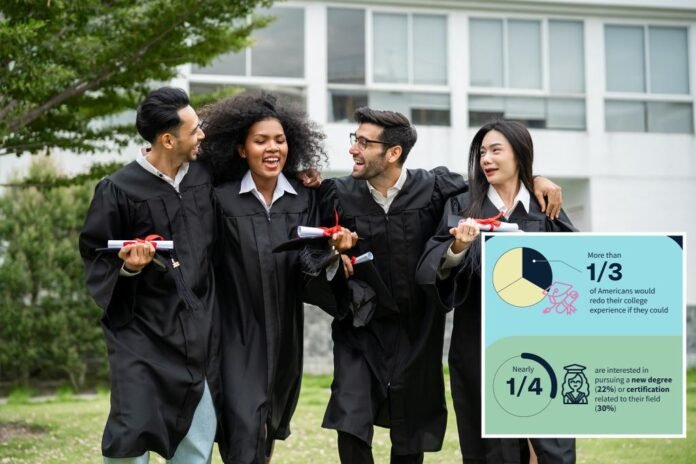More than a third of Americans would take a second shot at college if they could redo their choices. A new survey found that 38 % of U.S. adults would happily go back to school, and even 43 % of college graduates say they would switch majors or schools.
Why people want a redo
Most respondents point to two main reasons: a chance to try a new career and the hope of earning more money. Nearly one‑quarter of adults (22 %) are looking to pursue a fresh degree, while 30 % want a certification that ties directly to their current field.
The survey, conducted by Talker Research for CSU Global from September 13‑18, 2025, sampled 2,000 adults across the country. It split respondents into those who had a degree and those who did not, and it found that both groups would not pass up another college run‑through.
Life changes drive the desire for more education
The average person says they’ve made three major life changes in the past five years. These include illness or a family loss (41 %), job or career shifts (37 %), and moving states (24 %). About one in eight people said they had at least one big change every year.
Those who changed careers in the last five years usually did it twice, and one in six felt unprepared for the transition. Roughly 34 % of adults are now interested in attending college, compared with only 25 % who weren’t as interested when they were the right age to start.
Job market pressure and the rise of AI
Job‑seekers feel the market’s push sharply. A third of those employed say the current job landscape drives their wish to redo college “very much.”
Almost 63 % believe a “practical” degree—one that gives useful skills—would help today, even if their job doesn’t require it. Most of the practical routes are in education, business, communications, or healthcare (10 % each).
For many graduates, a degree still feels relevant. 68 % of employed college‑grad respondents say it fits their job, though 18 % feel it does not.
When asked which fields would most help them now, respondents highlighted artificial intelligence and machine learning (20 %), healthcare (13 %), cybersecurity (13 %), accounting (13 %), and business or economics (9 %).
Dr. Becky Takeda‑Tinker, president of Colorado State University Global, said the tech boom is reshaping skills every few years. “A skill that was high‑demand a few years ago can be obsolete today; staying up‑to‑date through reskilling or upskilling is key,” she explained.
AI worries aren’t just hype. Four‑in‑ten employed people (39 %) fear their field could shrink or disappear because of AI. Soon after, 45 % believe boosting their AI knowledge could advance them professionally.
Barriers to re‑entering school
Despite the enthusiasm, many still feel stuck. The biggest obstacles are money (30 %), other priorities (22 %), and time (21 %).
45 % say today’s college experience differs from what it was five years ago, and 57 % think the same about the past decade.
What people want from a modern college
If they could attend classes now, respondents wanted the chance to change careers, earn more, learn something new, or simply enjoy the experience.
When it comes to how they’d study, more than half (54 %) want either hybrid or fully online courses over in‑person only. Dr. Takeda‑Tinker noted that “traditional in‑person schedules are no longer the default. High‑quality fully online, asynchronous options let working adults keep their jobs and families while boosting their marketability.”
Survey highlights
- 2,000 Americans surveyed online
- Conducted Sep. 13‑18, 2025
- Commissioned by CSU Global, run by Talker Research
The findings show a clear trend: Americans want flexible, practical education that keeps pace with a fast‑changing job market—and most believe a second chance at college could help them do just that.
Source: New York Post
Stay informed on all the latest news, real-time breaking news updates, and follow all the important headlines in world News on Latest NewsX. Follow us on social media Facebook, Twitter(X), Gettr and subscribe our Youtube Channel.



